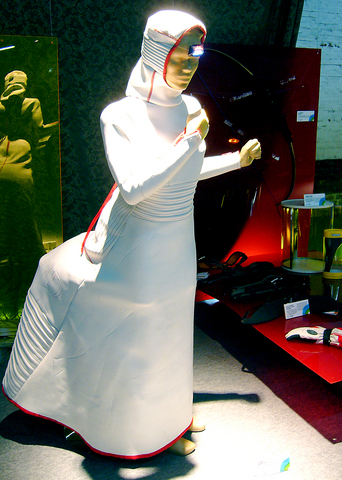For readers in the Kaohsiung area looking to fill their apartments with stuff they really don't need but feel they should have anyway, a visit to 2005 Taiwan Design Expo (台灣設計傳覽會) is in order.
The expo runs until Oct. 30 at the city's Wei Wu Military Camp
Co-sponsored by the Kaohsiung County Government this year's event focuses on everyday household products under the theme "Discover the New Home in Asia." Divided into five categories, the expo introduces a smorgasbord of new designs ranging from furniture to kitchen utensils and children's playthings.

PHOTO: GAVIN PHIPPS, TAIPEI TIMES
Those looking to spend their hard-earned cash on stuff that looks nice but that one can live without or, as the official English language guide puts it: "[to] learn creative esthetics of living up your life and building a [perfect] home."
From innovative and, admittedly, quite comfortable bamboo and wickerwork furniture, to two-person bathtubs, the expo features just about every conceivable form of product design. Some of the objects are already on the market, some of them are manufactured to order and others are, well, simply so batty that it makes you wonder why anybody would get paid to design them let alone why anybody would possibly want to buy them.
Visitors can wonder through the long disused military base's barracks and take in the contents of over a dozen specially designed pavilions.
"The Future Pavilion" predictably enough features futuristic designs for furniture and household objects, many of which look like they've come straight off the 1960s sci-fi TV series Space 1999.
The most interesting of the pavilions is the one dedicated to international design. The wide array of oddball household objects on display here includes ergonomic oven gloves that resemble flippers, a tubular cognac bottle that looks like it belongs on the International Space Station, gaudy 1970s-styled plastic tea pots and tea sets that wouldn't look out of place on an episode of the Brady Bunch.
The most inane of the lot, however, is the French-designed wedding dress that doubles as all-purpose sportswear and allows any modern bride the freedom to go for a quick jog before saying "I do."
The wildest pavilions are the "The Green" and "Home Forest" pavilions, which are filled with over-the-top bamboo structures designed to transform living spaces into urban
jungle-like environments.
Along with showcasing the oddball human aspects of modern design the expo also features a special area dedicated to pets. Here visitors can see outrageous designs for "pet houses" for dogs, cats and even hamsters. It's pretty inane, but it does make for an interesting and certainly mind opening visit.
Performance notes:
What: Taiwan Design Expo 2005
Where: Wei Wu Military Camp, Nanking Rd, Fangshan City, Kaohsiung County
When: Until Oct. 30.

Taiwan has next to no political engagement in Myanmar, either with the ruling military junta nor the dozens of armed groups who’ve in the last five years taken over around two-thirds of the nation’s territory in a sprawling, patchwork civil war. But early last month, the leader of one relatively minor Burmese revolutionary faction, General Nerdah Bomya, who is also an alleged war criminal, made a low key visit to Taipei, where he met with a member of President William Lai’s (賴清德) staff, a retired Taiwanese military official and several academics. “I feel like Taiwan is a good example of

March 2 to March 8 Gunfire rang out along the shore of the frontline island of Lieyu (烈嶼) on a foggy afternoon on March 7, 1987. By the time it was over, about 20 unarmed Vietnamese refugees — men, women, elderly and children — were dead. They were hastily buried, followed by decades of silence. Months later, opposition politicians and journalists tried to uncover what had happened, but conflicting accounts only deepened the confusion. One version suggested that government troops had mistakenly killed their own operatives attempting to return home from Vietnam. The military maintained that the

Before the last section of the round-the-island railway was electrified, one old blue train still chugged back and forth between Pingtung County’s Fangliao (枋寮) and Taitung (台東) stations once a day. It was so slow, was so hot (it had no air conditioning) and covered such a short distance, that the low fare still failed to attract many riders. This relic of the past was finally retired when the South Link Line was fully electrified on Dec. 23, 2020. A wave of nostalgia surrounded the termination of the Ordinary Train service, as these train carriages had been in use for decades

Lori Sepich smoked for years and sometimes skipped taking her blood pressure medicine. But she never thought she’d have a heart attack. The possibility “just wasn’t registering with me,” said the 64-year-old from Memphis, Tennessee, who suffered two of them 13 years apart. She’s far from alone. More than 60 million women in the US live with cardiovascular disease, which includes heart disease as well as stroke, heart failure and atrial fibrillation. And despite the myth that heart attacks mostly strike men, women are vulnerable too. Overall in the US, 1 in 5 women dies of cardiovascular disease each year, 37,000 of them